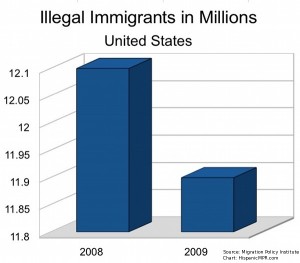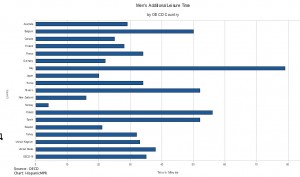Posted by Elena del Valle on September 27, 2010

Illegal Immigrants United States 2008-2009 – click to enlarge
As the recession hit the United States it also affected employment including employment of the undocumented. In spite of all the controversy around Arizona’s anti illegal immigrant legislation and federal troops heading to our southern borders there are fewer illegal immigrants in our country now than in recent years.
According to the Migration Policy Institute, a Washington, DC organization, the number of foreigners illegally in the United States is down from an estimated 12.1 million in July 2008, to 11.9 million a year later, and less now. Another telltale indicator that immigrants, like everyone else, have been affected negatively by the economy is the drop in remittances from the United States south. The Institute website sites anecdotal evidence that some Mexican families have sent money to their relatives in the Unites States to help them. Even the demand for visas was down compared to previous years, according to visa statistics sited by the Institute.
Because many immigrants share demographic characteristics with the groups most likely to be affected by the recession such as youths, the uneducated, and new members of labor force often they have been more likely to be victims of the recession; and foreign-born workers are also overrepresented in the construction, manufacturing, leisure and hospitality, and support and personal services industries which have been especially affected by the downturn in the economy, according to the Institute.
The United States is not alone in dealing with immigration issues. A report published recently by the Organization for Economic Co-operation and Development (OECD), which tracks changes in 29 developed countries, indicates that in 2008 the migration of people to developed countries decreased 6 percent to 4.4 million and probably fell more last year. In the five years prior to the recession, movement of migrants into developed countries was high. In spite of the economic hardships few, including the illegal immigrants in the United States, returned to their countries of origin.
Posted by Elena del Valle on June 1, 2009

Click to enlarge
Do you think men and women share equally in the household duties? Do you think they both have the same amount of time free to enjoy activities of their choice? If you said yes you might be surprised by the results of a recent survey of Organization for Economic Co-operation and Development (OECD) conducted in 18 industrialized countries including the United States. According to researchers, men have more leisure time than women in all of the countries they examined.
The gap between the genders seems to be strongest in Catholic countries. For example, Italian men have 80 minutes more of leisure time than women in their country. Norway, on the other hand, seems to have the greatest gender equality when it comes to leisure time. In that country, men only have a few more minutes of leisure than women. American men have 40 minutes more leisure time per day than women.
What do people do when they have free time? In Mexico and Japan, they spend almost half their leisure time watching TV. People in New Zealand spend less than 25 percent of their leisure time watching the tube. People in Turkey, the most sociable nation, spend 35 percent of their leisure time entertaining friends. In Spain, people spend 13 percent of their time off doing physical activities, making that nation the most active one in that category.
The information was published in the latest edition of Society at a Glance, a publication of the OECD that features an overview of social trends and policy developments in OECD countries relying on indicators from OECD studies and other sources. One of the chapters in the report was dedicated to leisure time in the 18 OECD countries for which up-to-date time-use surveys are available from 2006, and based on nationally representative samples of between 4,000 and 200,000 people.
OECD provides a forum for member governments to compare policy experiences, “seek answers to common problems, identify good practice and coordinate domestic and international policies.”
“Happy for No Reason” audio recording

Presenter Marci Shimoff, author, Happy for No Reason
What: An audio presentation by Marci Shimoff and Q&A with Marci Shimoff and HispanicMPR.com audio program host Elena del Valle about finding happiness.
Available exclusively on HispanicMPR.com!
Click here to listen to a short interview with Marci
Click here for more information on “Happy for No Reason” audio recording with Marci Shimoff












